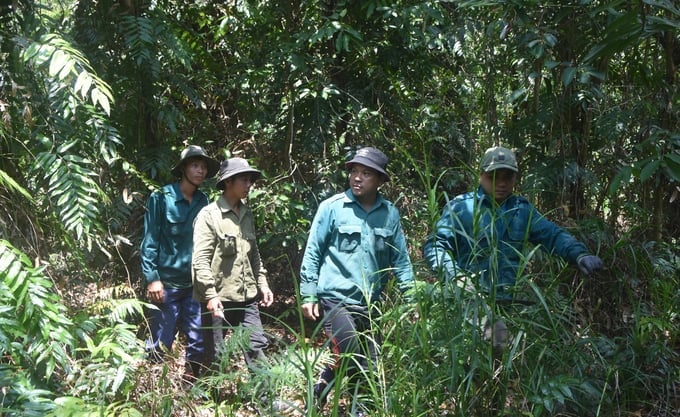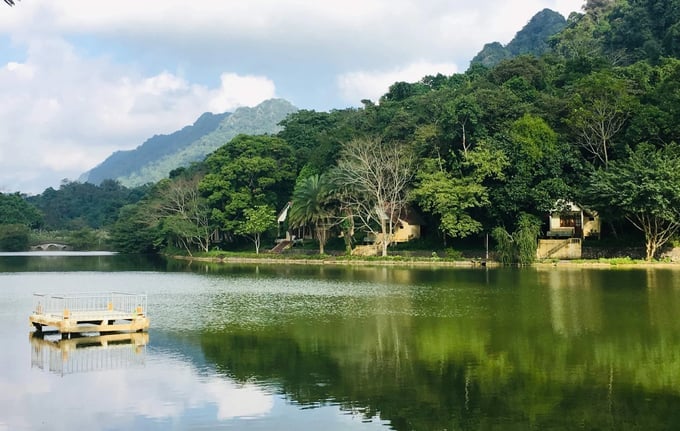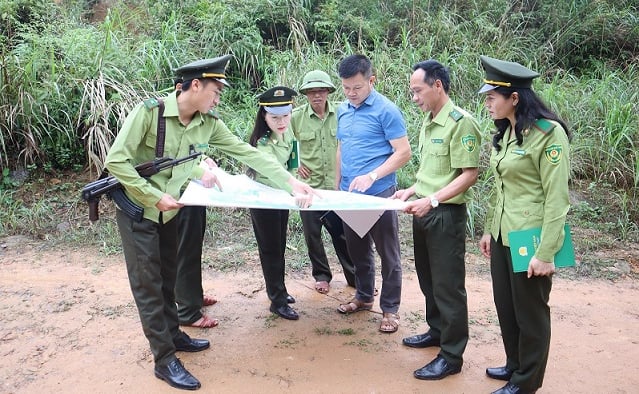November 24, 2025 | 16:31 GMT +7
November 24, 2025 | 16:31 GMT +7
Hotline: 0913.378.918
November 24, 2025 | 16:31 GMT +7
Hotline: 0913.378.918
A new addition to the Decree is the amendment and supplementation of Article 14, which regulates the procedures for constructing, appraising, approving, and implementing eco-tourism, resort, and entertainment projects in special-use forests.

Forest protection officers at U Minh Ha National Park. Photo: Trong Linh.
According to the new Decree, forest owners must specify the location, scale, materials, height, density, projected ratio, and duration of eco-tourism, resort, and entertainment projects, with regards to the current status of individual forest in each area, thereby maintaining the forest's function.
In addition to solutions for forest protection and development, nature conservation, biodiversity preservation, environmental protection, and fire prevention and control, forest owners must also specify solutions for capital, investment resources, methods of organizing eco-tourism, resort, and entertainment activities, and leasing prices for the forest environment.
The annual financial plan, which is funded by the forest owners' environmental service revenue or other legitimate financial sources, must include a budget for developing ecotourism, resort and entertainment projects.
Regarding the procedures for appraising and approving project proposals, forest owners are required to submit one set of documents, as opposed to the previous requirement of two sets, to the Department of Agriculture and Rural Development for special-use forests managed by local authorities; or to the local Department of Forestry for special-use forests managed by the Ministry of Agriculture and Rural Development.
If the submitted documents are invalid, the receiving agency must, within three working days from the date of receipt, send a written request with detailed reasons to the forest owner for correction.
Within five days of receiving the valid set of documents, the receiving agency must request written appraisal comments from relevant stakeholders. Subsequently, stakeholders must submit their written responses to the receiving agency within fifteen days of receiving the aforementioned request.
The receiving agency must complete the appraisal process within fifteen days of receiving the written appraisal comments, thereby shortening the process by five days compared to Decree No. 156. Within ten days of receiving the complete set of documents, the Chairman of the Provincial People's Committee (for special-use forests managed by local authorities) or the Ministry of Agriculture and Rural Development (for special-use forests managed by the Ministry) must issue a decision on the approval of the project proposal, shortening the process by five days compared to previous regulations.

Cuc Phuong National Park – a special-use forest that offers a variety of tourism activities. Photo: Tung Dinh.
According to Clause 6, Article 14 under Decree No. 91, forest owners are permitted to lease special-use forest environments to organizations and individuals through forest environment lease contracts for eco-tourism, resort, and entertainment services.
The leasing process must be publicly announced for a minimum of 30 days through various channels: posting at the office headquarters; publishing on the forest owner's official website (if available), and on the information portal or website of their direct superior authority.
During the lessee selection process, applicants are responsible for providing general information regarding forest owners; the location, area, and site of the forest environment for lease; and the proposed methods for organizing eco-tourism, resort, and entertainment services. A summary of the eco-tourism, resort, and entertainment project approved by competent state agencies must also be included, in addition to technical documents, and the submission time and address.
On the other hand, forest owners must provide technical documents for the selection of forest environment lessee. These documents, which must be approved by the forest owner before public announcement, should include requirements for the lessee's capacity and experience in eco-tourism, resort, and entertainment activities.
Additionally, the implementation plan must comply with the approved project; financial investment plan; projected revenue and forest environment lease pricing plans; post-contract plans for assets; and commitments to project implementation schedule and revenue generation.
Accordingly, prioritized lessees include organizations and individuals that demonstrated remarkable performance in forest protection and development, nature conservation, and biodiversity preservation during their previous forest protection contracts.
The criteria listed in the technical documents will be assigned point values for evaluation and selection, with a minimum qualifying score for each criterion. The total maximum evaluation score is set at 100, with a stipulated minimum qualifying total score. Applicants will be marked as qualified if they achieve the minimum score for each criteria and the overall minimum qualifying score.
The lease price for forest environments in the lessee's application is calculated as a percentage of total revenue. This price must be converted to an absolute value for evaluation by the forest owner, as specified in the forest environment lease contract.
If the actual percentage of total revenue converted to an absolute value is lower than the absolute value stated in the contract, the amount the lessee must pay to the forest owner must match the amount specified in the contract.
Forest environment lessees for eco-tourism, resort, and entertainment services in special-use forests are exempt from paying for forest environmental services for the leased area.
The lease period for the forest environment may last up to thirty years, with periodic evaluations of contract performance every five years. If the lessee complies with the contract and requests an extension at the end of the lease period, the forest owner may approve an extension of up to two-thirds of the initial lease period.
Before signing the forest environment lease contract, the forest owner must conduct an inventory and survey of the forest status in the leased area. These activities will serve as the basis for delimiting boundaries, assessing current status, and managing, supervising, and evaluating contract implementation.

Bac Giang province's forest protection officers at Tay Yen Tu Nature Reserve. Photo: Bao Thang.
Forest owners or lessees are responsible for preparing a feasibility study report for eco-tourism, resort, and entertainment projects. This report must comply with the National Forestry Planning or provincial planning as approved by competent state authorities; sustainable forest management plans; and eco-tourism, resort, and entertainment project proposals as approved by competent state authorities.
Eco-tourism, resort, and entertainment projects involving the construction, preparation, appraisal, approval, and management of tasks during the project preparation phase, implementation phase, and completion phase must comply with construction regulations.
Projects without components pertaining to the construction, preparation, appraisal, approval, and management of the project must comply with investment regulations, investment laws, and other relevant laws.
Forest owners are responsible for providing instructions, inspecting, and supervising lessees; or cooperating in implementing eco-tourism, resort, and entertainment projects in compliance with regulations.
If the lessee fails to implement the project within 24 months from the date of signing the cooperation or lease contract, the forest owner may consider terminating the contract. Exceptions include natural disasters, disease outbreaks, legal procedural obstacles, and other force majeure events agreed upon by both parties.
Translated by Nguyen Hai Long

(VAN) Viet Nam is entering the pivotal period of 2025-2030, moving toward the formulation of the Remote Sensing Law, which will establish a legal foundation for the development of national digital data.

(VAN) The agricultural sector is finalizing the strategic framework for emission reduction, setting the goal of sharply cutting methane and 403.7 million tons of CO2 equivalent and moving toward Net Zero by 2050.
/2025/11/22/2236-1-153832_483.jpg)
(VAN) The National Marine Spatial Planning is opening up opportunities for sustainable blue sea development across 21 coastal localities.

(VAN) Viet Nam’s forestry sector is undergoing a comprehensive transformation, strengthening management, protection, and development efforts to maintain ecological security and drive green, sustainable growth.

(VAN) Viet Nam is accelerating efforts to digitize reservoir operations, from real-time data to hydraulic modelling.
/2025/11/21/3348-2-102623_454.jpg)
(VAN) National Assembly delegate Nguyen Thi Lan has proposed adding special mechanisms to attract human resources to the agricultural, forestry, and fishery sectors, addressing the shortage of high-quality personnel.

(VAN) Over the past two decades, the unified legal framework for water resource management has been perfected, becoming a crucial foundation for ensuring national water security.